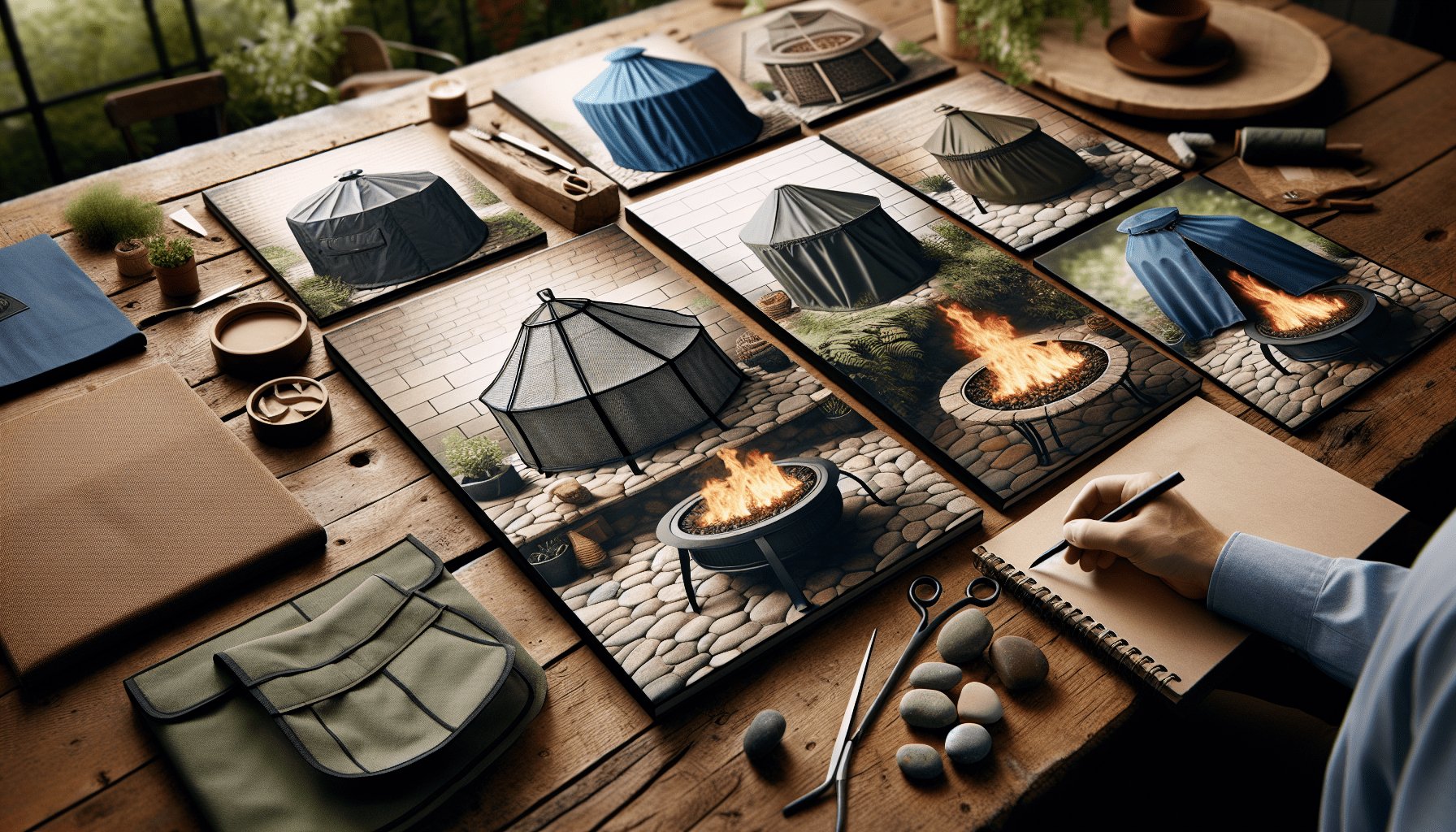Have you ever found yourself gazing at your backyard fire pit, wondering how to keep it in pristine condition for those cozy evenings? Perhaps you’ve thought about investing in a cover, but have been overwhelmed by the options available. Choosing the right fire pit cover is essential in maintaining the integrity and longevity of your beloved outdoor feature. Let’s unravel the different types of fire pit covers and their uses to help you make an informed decision.

Understanding Fire Pit Covers
Fire pit covers are protective gear that shields your fire pit from various environmental elements. Whether it’s rain, snow, or the sneaky eyes of curious animals, a well-fitted cover can save you time and money in the long haul. Just like you protect your favorite sweater from moths, a fire pit cover does the same for your outdoor fire feature.
Why Use a Fire Pit Cover?
Using a fire pit cover has several benefits. It helps prevent rust and corrosion, protects against dirt and debris, and maintains the aesthetic appeal of your yard. In a way, it’s akin to putting on a raincoat when heading out in inclement weather – it just makes sense! So, let’s get into the various types of fire pit covers available to you.
Different Types of Fire Pit Covers
A variety of fire pit covers are available on the market today, each carrying unique features suited for different needs. Here, we’ll explore several common types.
Fabric Fire Pit Covers
Fabric covers are often made from heavy-duty materials like polyester or canvas. These options are lightweight and easy to handle, making them ideal for regular use.
Pros:
- Generally affordable
- Breathable fabric prevents moisture buildup
- Easy to store when not in use
Cons:
- May not be as durable against extreme weather
- Requires regular washing to keep clean
Hardtop Fire Pit Covers
If you’re looking for something more durable, hardtop covers could be your answer. These covers are typically made from materials like metal or blow-molded plastic and provide robust protection against harsh conditions.
Pros:
- Extremely durable and weather-resistant
- Can add a decorative touch to the fire pit area
- Multitasking: doubles as a table when not in use
Cons:
- More expensive than fabric covers
- Heavier and harder to remove and replace
Mesh Fire Pit Covers
Mesh covers serve a different purpose. They’re designed primarily for safety, keeping embers contained while allowing smoke to escape. They’re perfect for those who love to add a bit of flair to their fires.
Pros:
- Prevents flying embers and sparks
- Enhances the safety of your fire pit
- Generally lightweight and easy to use
Cons:
- Doesn’t offer protection from rain or snow
- Limited in terms of overall coverage
Custom Fire Pit Covers
If standard sizes don’t fit your unique fire pit, custom covers are the way to go. These covers are designed specifically for your fire pit dimensions, ensuring a perfect fit.
Pros:
- Perfectly tailored to your fire pit
- Available in a variety of materials and colors
- Maximum protection against the elements
Cons:
- Higher cost due to customization
- Longer wait time for production
Universal Fire Pit Covers
Universal covers are designed to fit a range of sizes and shapes. While they may not offer a custom-fit solution, they provide reasonable protection for various types of fire pits.
Pros:
- Flexible options for different fire pit shapes
- Usually more affordable than custom covers
- Easy to find in stores or online
Cons:
- May not fit perfectly; potential for gaps
- Less durable than custom options
Decorative Fire Pit Covers
If aesthetics are something you value highly, decorative covers combine protection with design. They usually feature stylish patterns or colors that seamlessly blend into your backyard decor.
Pros:
- Adds visual appeal to your outdoor space
- Offers necessary protection while remaining stylish
- Great for gatherings, ensuring all aspects are appealing
Cons:
- Often pricier than basic covers
- May require special care to maintain appearance

Seasonal Considerations for Fire Pit Covers
It’s essential to consider the seasons when choosing a cover. Each season brings about different weather conditions that can have various impacts on your fire pit. Let’s break these down.
Spring Showers
Spring can often be synonymous with rain, and the last thing you want is for your pit to become a muddy mess. A waterproof cover will guard against any unexpected downpours while keeping debris at bay.
Summer Sunshine
While the summer months may mean fewer rain worries, UV rays can wreak havoc on unprotected outdoor features. Look for covers that offer UV protection, keeping your fire pit looking vibrant and new.
Autumn Leaves
As leaves fall, so do twigs and other debris that can clutter your fire pit. A fitted cover can easily keep these out, preventing rust and decay. Furthermore, it also means fewer clean-ups when summer returns.
Winter Wonderland
For those living in regions with snow, sturdy hardtop covers or heavy-duty fabric covers can provide the best protection. Snow can weigh down on weaker covers, making the right choice essential during this season.
Maintenance and Care for Fire Pit Covers
Buying a cover is just the first step. Proper maintenance ensures its durability and effectiveness in protection.
Cleaning Your Cover
Regular cleaning is crucial in extending the life of your fire pit cover. Here are some tips to keep it in top shape:
- Use a mild soap, warm water, and a soft cloth or sponge to wipe down fabric covers.
- For hardtop covers, a simple rinse with a hose, followed by a dry cloth, will do wonders.
- Always check for debris and dirt before storing your cover.
Storing Your Cover
When not in use, consider storing your fire pit cover in a dry place, preferably indoors. Store fabric covers folded neatly to prevent creases. For hardtop covers, ensure they’re stored flat to maintain their shape.
Inspect for Damage
Before and after heavy seasons, inspect your covers for any signs of damage, such as tears or wear. Address any issues quickly to prevent them from worsening.
Making Your Decision
Choosing the right fire pit cover can sometimes feel overwhelming with so many options available. It’s always helpful to consider your specific needs and the role your fire pit plays in your life. Reflect on questions like:
- How often do you use your fire pit?
- Are there extreme weather conditions in your area?
- Do you have a particular aesthetic you want to maintain in your outdoor setting?
By answering these questions, you can narrow down your choices, ensuring you select the cover that aligns perfectly with your needs.
Conclusion
Selecting the right fire pit cover is an important decision that keeps your cherished outdoor space in pristine condition. You have various options from fabric to hardtop, each serving a unique purpose and offering different levels of protection. Remember, investing in a cover is more than just a purchase; it’s an investment in the longevity and enjoyment of your fire pit.
So, whether you lean towards the practicality of fabric covers, the durability of hardtops, or the beauty of decorative options, your choice will ensure countless cozy nights around the fire, sharing stories, laughter, and warmth with those you cherish. Happy relaxing!

